- Home
- Our Learning
- Pupil Premium
Pupil Premium
Pupil Premium 24/25
What is Pupil Premium?
Pupil Premium is an allocation of funding that is given to us by the government to support children who may be vulnerable to under-achievement. The amount we receive is based on the number of children that we have who are entitled to Free School Meals (FSM) or who are ‘Children in Care’ (CIC). We receive the equivalent of £1,480 for every child who is currently in receipt of Free School Meals plus some additional funding that is based on the number of children who have had Free School Meals in the past 6 years but are no longer eligible. As a school, we have a responsibility to report on the progress of children receiving pupil premium; demonstrate how we are using the Pupil Premium Grant (PPG) and the impact that it is having on children from disadvantaged backgrounds.
How much Pupil Premium Money do we get?
In the academic year 2024/2025 our Pupil Premium Funding will be approximately £228,360.00.
What do we use this money for?
At Gray's Farm, pupil premium money is used to fund some important roles within our school. These roles are all predominantly focused on raising academic standards especially in Reading, Writing and Mathematics, whilst also supporting children’s emotional and behavioural needs to enable them to learn more effectively. Our ultimate aim for the spending of this money is to prepare our children for the real world and offer them valuable learning experiences that will facilitate their learning and shape them into well-rounded individuals. Our current Pupil Premium strategy is a three year plan which focuses on diminishing the attainment gap between disadvantaged children and their non-disadvantaged peers by addressing the challenges that we have identified for our school. Within this strategy we have identified three key areas to focus on to ensure the gap between disadvantaged children and their peers continues to close and barriers to educational achievement are overcome.
Our detailed Pupil Premium Strategy for the 2024/25 academic year, along with a review of the previous year’s PPG impact (2023/24), can be found here.
How will this money be spent?
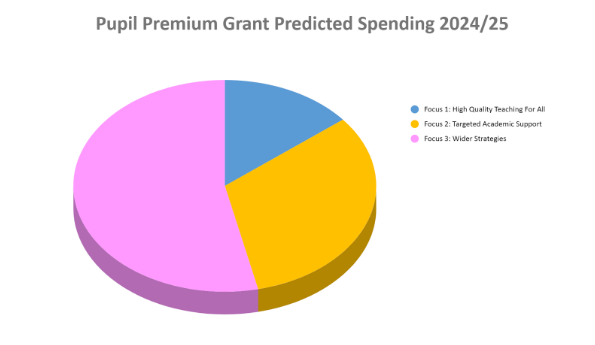
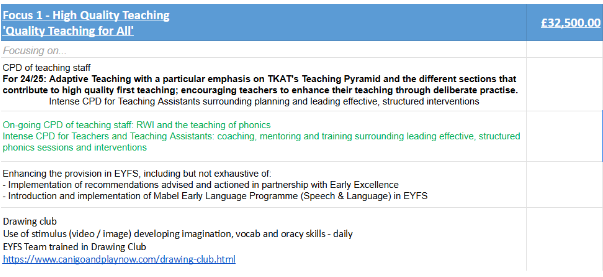
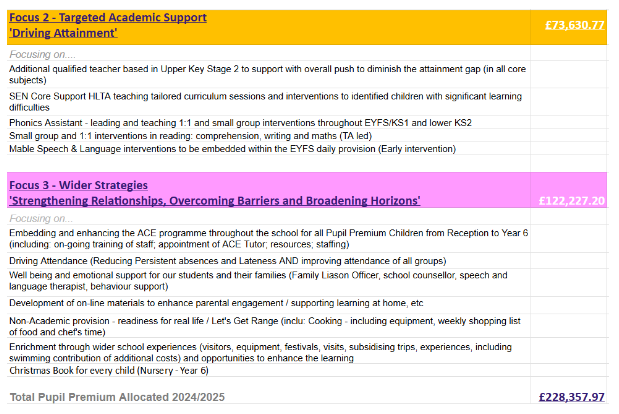
Review the Impact: How is The Pupil Premium helping?
To read our review of the pupil premium strategy outcomes and see the impact that our pupil premium activity and expenditure had on pupils in the 2023/24 academic year please click here.
When will this Pupil Premium Strategy be reviewed?
This year’s Pupil Premium Strategy will be reviewed at the end of each whole term, considering available data and reflecting on the impact, effect and success to that date of each planned strategy. Based on such reflection, the strategy will be adapted to ensure the grant has maximum impact and continues to alleviate the gap between disadvantaged pupils and their peers. At the end of the academic year, the Pupil Premium Strategy will be reviewed and shared with wider audiences (December 2025).
What is Pupil Premium?
Pupil Premium is an allocation of funding that is given to us by the government to support children who may be vulnerable to under-achievement. The amount we receive is based on the number of children that we have who are entitled to Free School Meals (FSM) or who are ‘Children in Care’ (CIC). We receive the equivalent of £1,455 for every child who is currently in receipt of Free School Meals plus some additional funding that is based on the number of children who have had Free School Meals in the past 6 years but are no longer eligible. As a school, we have a responsibility to report on the progress of children receiving pupil premium; demonstrate how we are using the Pupil Premium Grant (PPG) and the impact that it is having on children from disadvantaged backgrounds.
In the academic year 2023/2024 our Pupil Premium Funding will be approximately £264,368.50 (this figure includes £23,490 recovery premium of which 10% has been pooled by TKAT).
At Gray's Farm, pupil premium money is used to fund some important roles within our school. These roles are all predominantly focused on raising academic standards especially in Reading, Writing and Mathematics, whilst also supporting children’s emotional and behavioural needs to enable them to learn more effectively. Our ultimate aim for the spending of this money is to prepare our children for the real world and offer them valuable learning experiences that will facilitate their learning and shape them into well-rounded individuals. Our current Pupil Premium strategy is a three year plan which focuses on diminishing the attainment gap between disadvantaged children and their non-disadvantaged peers by addressing the challenges that we have identified for our school. Within this strategy we have identified three key areas to focus on to ensure the gap between disadvantaged children and their peers continues to close and barriers to educational achievement are overcome. These are:
1] High Quality Teaching: ‘Quality Teaching for All’
Planning and providing a curriculum that raises academic standards; is diverse and representative of all; addresses historic health and wellbeing issues heightened during the pandemic and reduces the gap between disadvantaged children and their peers. For the academic year 2023/2024, whilst enhancing and embedding on-going approaches and initiatives currently in place, there will be a great focus on restructuring the professional development of all teaching and learning staff, with a particular focus on using adaptive teaching throughout the school - considering how scaffolding and the development of oracy skills will allow children to better articulate their ideas, consolidate understanding and extend vocabulary.
2] Targeted Academic Support ‘Driving Attainment’
This particular focus considers how we can use staff to further drive attainment, particularly for children from disadvantaged backgrounds.Heavily embedded within this focus area, is the enhancement and implementation of early intervention; providing tailored support to identified groups through regular, focused programmes/schemes in all key stages, including early intervention in the EYFS setting.
3] Wider strategies ‘Strengthening relationships, overcoming barriers and broadening horizons’.
This particular area is where a large proportion of our Pupil Premium Grant is allocated. It allows us to continue to provide support to families to improve the overall attendance of all children and their readiness to learn, whilst reducing the attendance gap between disadvantaged children and their peers. It allows us to provide support to families and students with educational and non-educational needs, through both internal and external support networks.
This year, we will continue to embed and build on the success of the ACE programme (A Champion for Every Child Programme). The ACE programme aims to significantly reduce (and where possible) remove the barriers to learning for disadvantaged children across all key stages so that they can meet their full potential. ACE is a whole school strategy which allocates a champion for all disadvantaged pupils and their families so that they have regular access to 1:1 sessions with their ACE Tutor - resulting in the building of relationships between school and home, which in turn can act to counter any barriers to learning that students may have.
Within this area we will also continue to provide opportunities to further enhance our children’s emotional happiness and cultural capital. This continues to include the continual development of the wider curriculum; embedding a broader curriculum that engages the children; challenges stereotypes through representation and provides opportunities for cross curricular learning that is built on as the children move up through the school. In an attempt to offer memorable experiences outside the classroom environment, we are continuing to allocate some of our Pupil Premium Grant to enhance the Let’s Get cooking programme. This year, we will continue to educate the children on the importance of eating a healthy diet through the Cooking programme, teaching them how to make healthy, informed choices whilst encouraging wholesome lifestyles. Children in years 4-6, will continue to access planned sessions with the professional kitchen staff; learning how to prepare and cook budget-friendly, healthy meals that can feed the whole family, whilst being introduced to a potentially new pallet of foods.
Our detailed Pupil Premium Strategy for the 2023/24 academic year, along with a review of the previous year’s PPG impact (2022/23), can be found here.
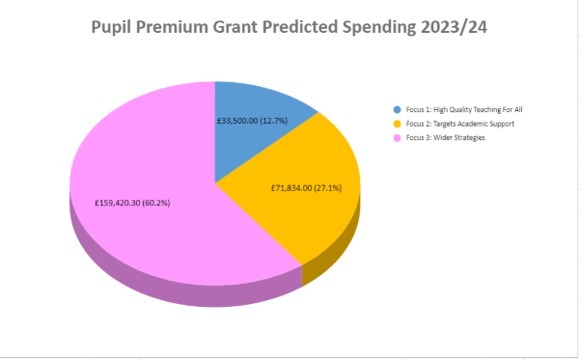
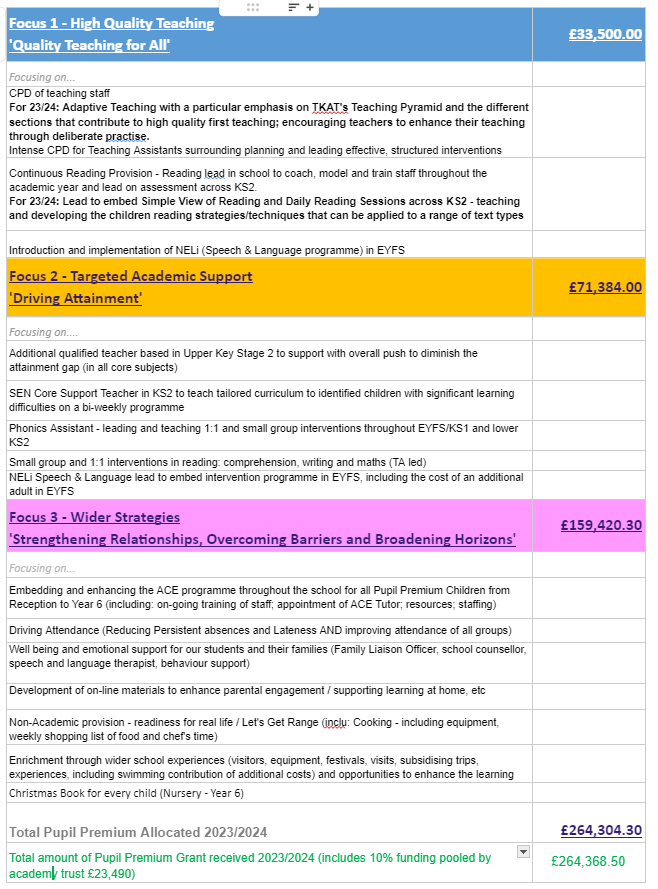
To read our review of the pupil premium strategy outcomes and see the impact that our pupil premium activity and expenditure had on pupils in the 2022/23 academic year please click here.
This year’s Pupil Premium Strategy will be reviewed at the end of each whole term, considering available data and reflecting on the impact, effect and success to that date of each planned strategy. Based on such reflection, the strategy will be adapted to ensure the grant has maximum impact and continues to alleviate the gap between disadvantaged pupils and their peers. At the end of the academic year, the Whole 3-year Pupil Premium Strategy will be reviewed and shared with wider audiences (December 2024). Likewise, a new Strategy will be written based on the school’s identified challenges and allocation of PPG to continue to actively work on diminishing the attainment gap between PP children and their Non-PP peers.
Pupil Premium 22/23
In the academic year 2022/2023 our Pupil Premium Funding will be approximately £247,860 (this figure includes 10% funding (£23,490) pooled by the TKAT academy trust ).
At Gray's Farm, pupil premium money is used to fund some important roles within our school. These roles are all predominantly focused on raising academic standards especially in Reading, Writing and Mathematics, whilst also supporting children’s emotional and behavioural needs to enable them to learn more effectively. Our ultimate aim for the spending of this money is to prepare our children for the real world and offer them valuable learning experiences that will facilitate their learning and shape them into well-rounded individuals. Our current Pupil Premium strategy is a three year plan which focuses on diminishing the attainment gap between disadvantaged children and their non-disadvantaged peers by addressing the challenges that we have identified for our school. Within this strategy we have identified three key areas to focus on to ensure the gap between disadvantaged children and their peers continues to close and barriers to educational achievement are overcome. These are:
1] High Quality Teaching: ‘Quality Teaching for All’
Planning and providing a curriculum that that raises academic standards; is diverse and representative of all; addresses health and wellbeing issues heightened during the pandemic and reduces the gap between disadvantaged children and their peers. One that enables us to diminish the gap and repair the long-term AND on-going impact of lost learning time (both academic and social) during school closures/on-line learning caused by COVID and other health restrictions. For the academic year 2022/2023, whilst enhancing and embedding on-going approaches and initiatives currently in place, there will be a great focus on the professional development of all teaching and learning staff, with a particular focus on using adaptive teaching throughout the school - considering how scaffolding and the development of oracy skills will allow children to better articulate their ideas, consolidate understanding and extend vocabulary.
2] Targeted Academic Support ‘Driving Attainment’
This particular focus considers how we can use staff to further drive attainment, particularly for children from disadvantaged backgrounds.Heavily embedded within this focus area, is the enhancement and implementation of early intervention; providing tailored support to identified groups through regular, focused programmes/schemes in all key stages, particularly EYFS.
3] Wider strategies ‘Strengthening relationships, overcoming barriers and broadening horizons’.
This particular area is where a large proportion of our Pupil Premium Grant is allocated. It allows us to continue to provide support to families to improve the overall attendance of all children and their readiness to learn, whilst reducing the attendance gap between disadvantaged children and their peers. It allows us to provide support to families and students with educational and non-educational needs, through both internal and external support networks.
This year, we will continue to embed and build on the success of the ACE programme (A Champion for Every Child Programme) which we piloted at Gray’s Farm last year. The ACE programme aims to significantly reduce (and where possible) remove the barriers to learning for disadvantaged children across all key stages so that they can meet their full potential. ACE is a whole school strategy which allocates a champion for all disadvantaged pupils and their families so that they have regular access to 1:1 sessions with their ACE Tutor - resulting in the building of relationships between school and home, which in turn can act to counter any barriers to learning that students may have.
Within this area we will also continue to provide opportunities to further enhance our children’s emotional happiness and cultural capital. This continues to include the continual development of the wider curriculum; embedding a broader curriculum that engages the children; challenges stereotypes through representation and provides opportunities for cross curricular learning that is built on as the children move up through the school. In an attempt to offer memorable experiences outside the classroom environment, we are continuing to allocate some of our Pupil Premium Grant to enhance the Let’s Get cooking programme. This year, we will continue to educate the children on the importance of eating a healthy diet through the Cooking programme, teaching them how to make healthy, informed choices whilst encouraging wholesome lifestyles. After piloting the programme last year in years 4-6, all children in these year groups will continue to access planned sessions with the kitchen staff; learning how to prepare and cook budget-friendly, healthy meals that can feed the whole family, whilst being introduced to a potentially new pallet of foods.
Our detailed Pupil Premium Strategy for the 2022/23 academic year, along with a review of the previous year’s PPG impact (2021/22), can be found here.
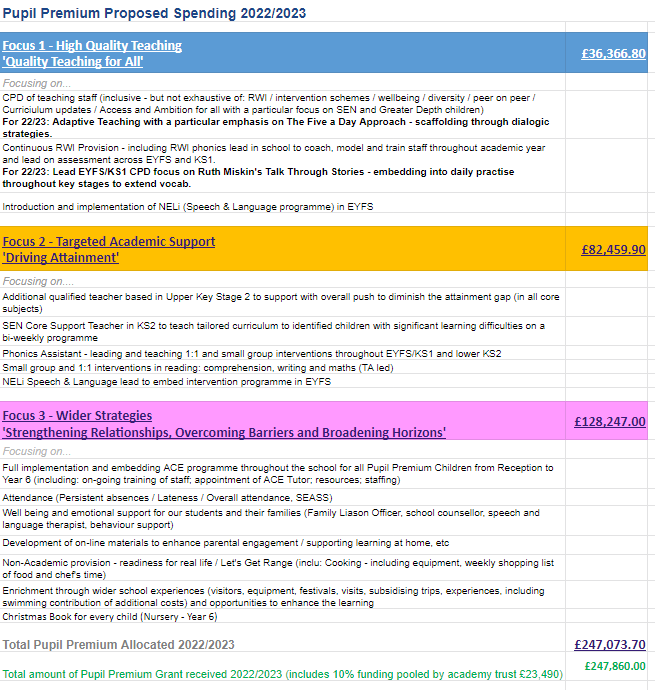
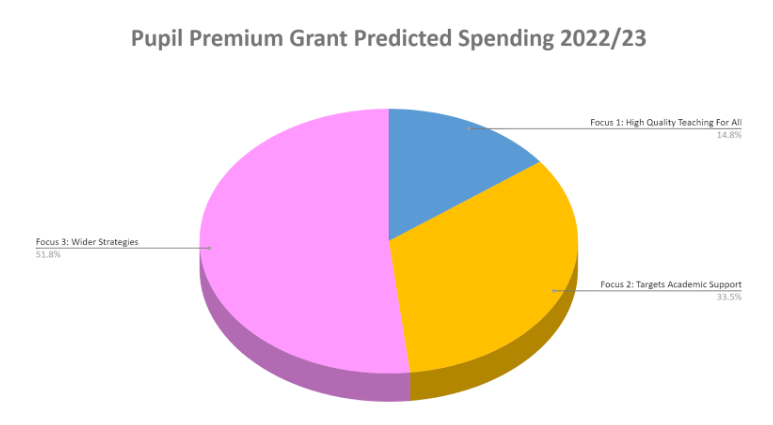
To read our review of the pupil premium strategy outcomes and see the impact that our pupil premium activity and expenditure had on pupils in the 2021/22 academic year please click here.
This year’s Pupil Premium Strategy will be reviewed at the end of each whole term, considering available data and reflecting on the impact, effect and success to that date of each planned strategy. Based on such reflection, the strategy will be adapted to ensure the grant has maximum impact and continues to alleviate the gap between disadvantaged pupils and their peers. At the end of the academic year, the Whole Pupil Premium Strategy will be reviewed and shared with wider audiences (December 2023).